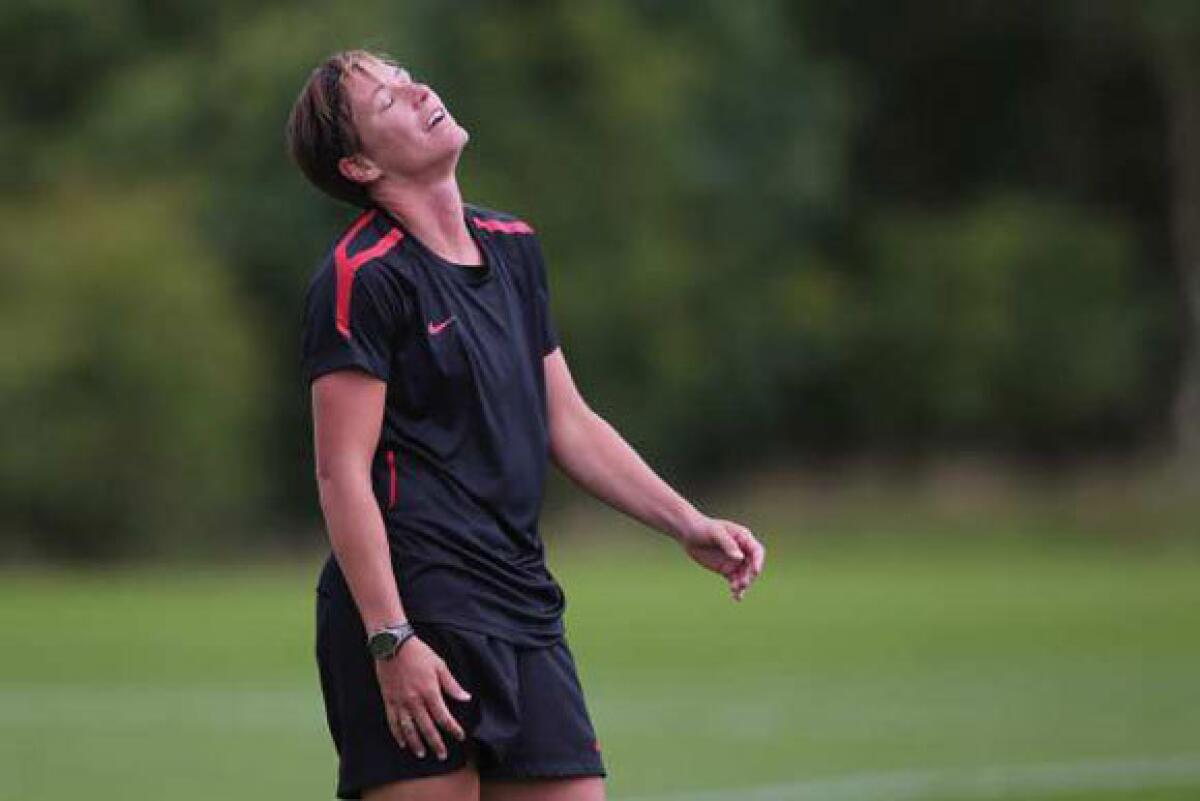For Abby Wambach, U.S. women’s soccer hasn’t peaked yet

- Share via
Abby Wambach’s goal has always been to leave the U.S. women’s soccer team better than she found it.
Talk about setting the bar high.
Wambach, after all, made her first appearance with the national team two years after its historic 1999 World Cup triumph. And her first set of teammates included Mia Hamm, Julie Foudy, Brandi Chastain, Kristine Lilly and Joy Fawcett, the soccer rock stars who put the sport on the map in the U.S.
“It felt like, maybe five years ago, it was too much to bite off,” Wambach says. “I wasn’t sure if I could have the kind of impact that Mia and the Fab Five had.”
Then came last summer, when the U.S. women captured the nation’s attention once again — this time in a tournament they didn’t even win.
A gutty comeback victory over Brazil on penalty kicks in the knockout stage and a heartbreaking penalty-kick loss to Japan in the World Cup final in Germany proved to be the biggest thing to happen to the sport here since Chastain took her shirt off on the floor of the Rose Bowl after the 1999 tournament.
The players and their silver medals got a heroes’ welcome in New York, made the rounds of the television talk shows and got to play soccer on the White House lawn with First Lady Michelle Obama.
Now, Wambach says, the goal is to build on that momentum in this summer’s Olympics, which kick off for the U.S. in Glasgow, Scotland, on Wednesday, two days before the Games officially open in London. In its first match, the U.S. will meet France, one of eight teams in the 12-nation field that are ranked among the world’s top nine.
“What we did last summer in the World Cup we hope pales in comparison to the kind of excitement that we can surround ourselves with during the Olympics,” Wambach says. “If we bring home a gold medal we’ll be able to push the sport even further forward.”
A gold medal would also push Wambach closer to her once-daunting goal of leaving the team better than she found it.
Before Wambach joined the national team, the U.S. had won a gold and silver in Olympic competition. Since then, the team has lost just once in 12 Olympic matches — and a victory this summer would give the U.S. an unprecedented three consecutive Olympic titles to go with a silver and two bronze medals in the last three World Cups.
But these Games could mark a passing of the torch in another way as well. Although Wambach isn’t talking retirement, she is 32, the same age Hamm was when she played her last match for the national team.
And in her final season, Hamm, the U.S.’ all-time leader in goals (158), was upstaged by a 24-year-old Wambach, who led the team with 31 scores — including the game-winner in overtime in the Olympic final with Brazil.
This summer Wambach, in turn, is in danger of being eclipsed by 23-year-old Alex Morgan, who goes into the Olympics leading the team with 17 goals — four more than Wambach — in 15 games this season.
Which is just fine with Wambach. In fact, she welcomes it.
“I would like to think that, yeah, there is a passing of the torch between Alex and I,” she says. “I’m not in it for any accolades. I’m not in it for making the front page of a paper.
“The reason why I’m playing is not about the stats. It’s about the championships. I want to win medals. And I know if I’m scoring goals and I know if Alex is scoring goals, I’m giving our team a better chance to win.”
Ask her teammates, though, and they’ll tell you that even if Wambach never scores again, just the fact that she’s in uniform gives the U.S. a better chance to win.
“Abby’s intensity is obviously so important for us,” says veteran midfielder Lauren Cheney. “We need someone that can get riled up like that. Her energy is contagious. And off the field, obviously, she’s a solid person, she’s a solid teammate.
“Abby’s very important for us.”
Adds defender Heather Mitts: “She’s not afraid to take the team on her back.”
Which is exactly what she did in the World Cup, scoring in each of the Americans’ last four matches, including a brilliant game-tying goal late in overtime against Brazil to force penalty kicks and a go-ahead score in overtime against Japan.
That not only landed her on the all-tournament team, but it made her U.S. Soccer’s female athlete of the year for the fifth time and helped her finish third in the voting for FIFA’s world player of the year.
Yet the person Wambach may have influenced most with all that is the one who is trying to take her job. Earlier this summer, when Morgan and Wambach shared a hotel room on a team trip, Morgan marveled over her roommate’s records, which include 138 goals in 182 matches with the national team.
Wambach answered by challenging Morgan to do better.
“Abby’s been a great influence,” says Morgan, a three-sport letter-winner at Diamond Bar High, where she was a soccer high school All-American. “She’s always helped guide me along. She really took me under her wing and taught me a lot about not only playing together but about the off-the-field and how you represent yourself.
“She’s been a great leader. And though I play the position where sometimes we’re competing for [opportunities] she’s really positive. It’s really great to see that.”
Among the specific pieces of advice Wambach gave Morgan was not to get hurt. Four years ago, in the last match before the Beijing Games, Wambach broke two bones in her left leg, forcing her to miss the Olympics and the first half of 2009 as well. In an incident eerily reminiscent of that, Morgan twisted her right knee midway through the final tuneup for this summer’s Olympics.
But after being attended to on the field, she was able to walk off and the injury isn’t expected to affect her in the Games.
Yet there’s a lesson to take from all that, Wambach says. The fame and the fun can all end in the fraction of a second it takes to break a bone or twist a knee. But it takes a lot more time and effort to build a legacy. And that’s what she wants to leave behind.
“In the timeline of a career, you can only hope that when you’re done playing you made a positive impact,” she says. “For the most part it’s a ‘pay it forward’ kind of feeling. I want to be sure that the opportunities that are there after I’m gone are much more than when I first arrived.”
More to Read
Go beyond the scoreboard
Get the latest on L.A.'s teams in the daily Sports Report newsletter.
You may occasionally receive promotional content from the Los Angeles Times.











